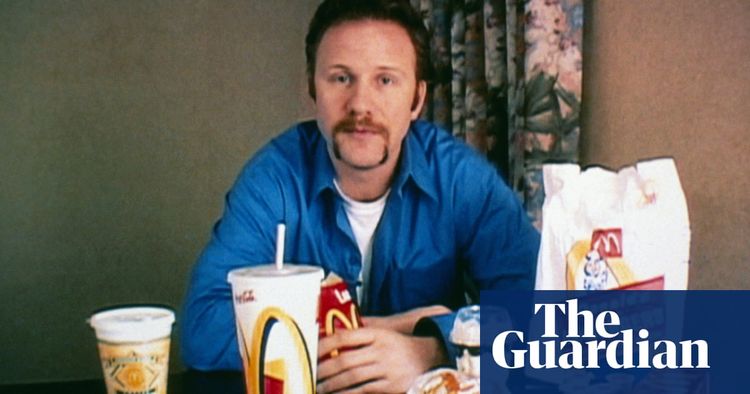Super Size Me: the film that sounded a fast-food alarm in America

When someone passes away, it's fulfilling to have something concrete or measurable that represents their impact – something that goes beyond simply raising a child or creating a portfolio. Morgan Spurlock, a filmmaker who recently passed away from cancer-related issues, could easily be credited with being the one person responsible for ending McDonald's super-sized meal option.
The employees who handle money at a popular fast food restaurant in the United States stopped giving customers extra-large portions for small prices six weeks after the Sundance film festival premiere of a documentary called Super Size Me, which was made by Morgan Spurlock in 2004. The movie had a message at the end that explained this change, and it was shown in theaters starting in May of the same year. Spurlock’s bold and potentially dangerous challenge to eat only enormous amounts of food from the restaurant operated by Ronald McDonald for 30 days started to change people's opinions about fast food and how it affected our health. Until then, the fast food restaurants had been a beloved part of American culture. He argued that the Big Mac sandwich was like cigarettes, a habit that was too tempting to resist and caused serious harm to our bodies. There is a viewpoint that considers Spurlock's documentary as a starting point that led us to the present changes such as offering fresher, healthier items like salads, listing calorie counts, and adding plant-based options to replace meat.
The documentary Super Size Me was released during the first term of the Dubya administration, when everything appeared to be larger than life. Right-wing individuals viewed gas-guzzling SUVs as a symbol of patriotism, and this attitude also extended to dietary choices, where being obese was regarded as a right. The US surgeon general even declared obesity an epidemic, a term now widely used. McDonald's business model took advantage of this national attitude in various ways, employing emotive mascots and chemical agents to boost happiness levels in consumers. These factors required robust opposition, and Spurlock provided it by condensing the gradual effects of irresponsible eating into a feature-length film. We witness his mental health decline as his waistline becomes visibly larger. Ultimately, Spurlock's conversations sound like those of a drug addict desperately craving their next hit.
Since Spurlock made his documentary, it has become a popular educational tool for biology teachers who need to grade assignments. However, academics scrutinizing the film's scientific value have found it to be lacking. It is not surprising that consuming large amounts of high-fat food without exercising will lead to negative consequences, and Spurlock did not improve his case by withholding details of his intake. Furthermore, his admission that he was drinking excessively during filming undermined his credibility. Critics accused Spurlock of attempting to balance entertainment with research without fully committing to either.
This section discusses how the film Super Size Me had some biases that favored liberal views while opposing conservative ones. The poster, in particular, painted a negative picture of fat people and used fear to make people believe that they too could be overweight if they weren't careful. However, the film's approach lacked a holistic view because it didn't consider how economic factors contributed to the prevalence of fast food restaurants like McDonald's in low-income neighborhoods. Instead, it framed every value meal purchase as a personal choice, which aligns with the Democrats' belief that the impoverished are incapable of making good decisions. Overall, the film missed an opportunity to explore the systemic factors that contribute to food deserts, which are areas where fresh and healthy food is hard to find.
Many people criticized Spurlock for putting too much emphasis on his showmanship instead of his important investigations. This criticism followed him throughout his career, even when he released a sequel to "Super Size Me" in 2017. In that movie, he tackled the issue of the chicken industry by creating a circus-like experience around his own brand of fried chicken. Despite his flawed approach and sometimes-distracting filming techniques, Spurlock was able to bring attention to important issues that were not yet widely discussed. While he could never take down the giant fast-food chain, he helped solidify their reputation as the "bad guys" in the public's mind. Despite his faults, Spurlock revealed a harsh truth about capitalism: corporations prioritize profits over our well-being.

















































